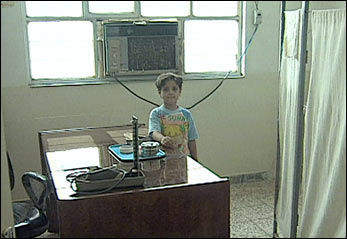Baghdad bombing delays refugees' return, but spirits remain undampened
Baghdad bombing delays refugees' return, but spirits remain undampened

ASHRAFI, Iran, August 27 (UNHCR) - Najem Abood Chowlan and his family have been very busy in the past few weeks packing their belongings accumulated over 12 years in Iran in readiness for their return to Iraq. But now, following last week's attack on the United Nations' Baghdad headquarters, they have had to put their plans on hold.
Najem is one of the 100 refugees who were to be on the first repatriation convoy back to Iraq organised by the UN refugee agency since the fall of the Saddam Hussein government. The convoy was expected to leave from Ashrafi refugee camp, in Iran's south-western Khuzestan province, during the last week of August, bound for Basra, crossing into Iraq via the Shalamsheh border crossing.
In the aftermath of last week's bomb attack on the UN in Baghdad, the convoy has been postponed while the world body reviews the security situation in Iraq.
There are more than 200,000 Iraqi refugees in the Islamic Republic of Iran, by far the largest group of Iraqi refugees in the world. About a quarter of them live in camps, the rest living among local Iranian communities, mainly in western Iran, but also in cities like Tehran and Qom.
The fall of Saddam's government in April brought hope to many that they soon would be able to go home. But the overall security situation in Iraq, as well as the lack of infrastructure and basic services, has delayed the start of organised convoys.
Some refugees are desperate to go home immediately, whatever awaits them. There have been reports of people attempting to make the trip back to Iraq on their own. The border between Iran and Iraq is one of the most heavily mined in the world, and crossing can be extremely dangerous.
Due to the grave danger facing spontaneous returnees who attempt to cross back into Iraq, UNHCR has been in close contact with the Iranian government and Iraq's Coalition Provisional Authority (CPA) to finalise plans to start helping small numbers of refugees cross homewards once the security situation permits.
"This dialogue with the Iranian government and the CPA is a plus that UNHCR can offer, that it has to offer, in order to assist the refugees to repatriate in the best possible conditions," says Philippe Lavanchy, the refugee agency's representative in Tehran.
For Najem's wife Hana, the sooner the better. She is not concerned about the security situation in the Basra area. "There is nothing going on there, our relatives in Basra say it is safe to go back now," she says. "We must go back soon, I want my children to be there, I want my family to take part in the rebuilding of our homeland. Iran has been good to us, but this is not our country."
Najem and his family fled Iraq in 1991 to escape Saddam's brutal repression of the Shi'ite uprising in the south in the aftermath of the 1991 Gulf War.
"I saw so many killings, hangings, executions," recalls Najem. "One day I saw Saddam Hussein's tanks rolling down our street, and that's when I decided we should leave. What else was I supposed to do to protect my family? Go and stand in front of the tanks with my boy? He was only eight at the time."
Since arriving in Iran, Najem and Hana have had two more children, Ebrahim, now 12, and Hoda, 10, both born in Ashrafi camp.
There are more than 11,000 Iraqi refugees in Ashrafi - making it the largest Iraqi refugee camp in Iran. The vast majority of Iraqis in the camp arrived from southern Iraq in 1991. With its long rows of houses, many shops and a mosque, Ashrafi looks more like a large village than many people's idea of a refugee camp.
But the Iraqis know that Ashrafi is not a permanent home. The refugees say that when they first came here, they thought they would stay only for a short while.
And they are eager to leave. More than 2,500 refugees have visited the Ashrafi clinic in the past month. Ashrafi's camp manager, Nadar Amidzadeh, says the numbers are higher than usual because people who are preparing to return want to make sure their children are vaccinated, their health checked and that they get advice on family planning. All treatment at the clinic is free of charge.

For the more serious cases, the camp has an ambulance to take the patients to the hospital, where UNHCR meets the costs of their treatment.
Ghanieh, a nurse at Ashrafi's clinic, says she is anxious to go back to her country very soon. "School in Iraq begins in September, and my two daughters want to go to university there," she explains. "If we can't go back before the end of September, they'll lose a whole school year."
In the meantime, the young refugees at Ashrafi, like children everywhere, are finding ways to amuse themselves during the summer school holidays.
Diving in a nearby canal is a popular pastime in the searing summer temperatures. But the children also want to return to Iraq, a country they have never seen, or are too young to remember.
"I have been here for 13 years," a teenage boy says while taking a break from swimming. "It has been 13 years of waste. My future is not here. We have to go back now to rebuild our country, because what happens to our country is our responsibility too."








